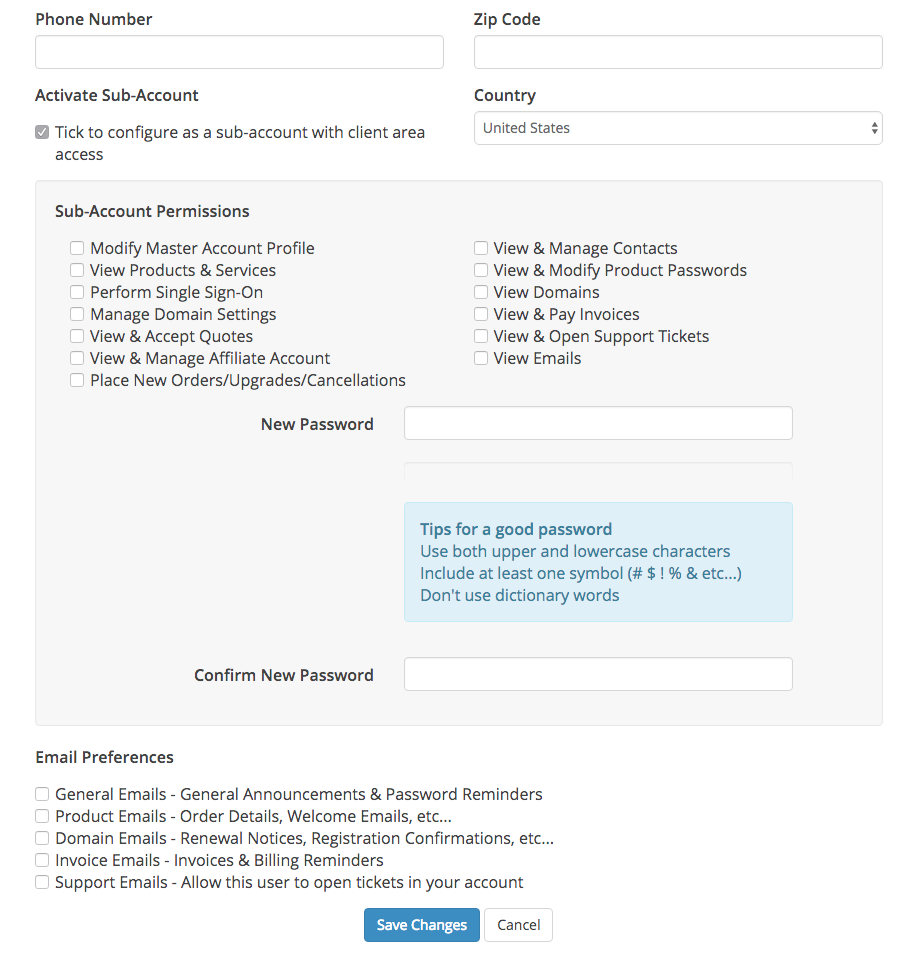What is an Account?
An Account, or Main Account, is you: a customer who registered on DomainRegister.international, and your data (name, surname etc.) are those you inserted in registering.
Those data are used for billing purposes too, and will be reported on every invoice.
You are allowed to change and correct your account data, if necessary (for example: change your address, if you move): to do so, after the login you can select the "Update" button.
What is a Contact ?
A Contact is a user profile that is mainly used for domain registering.
A Contact has no permissions to interact with services, and is not allowed to log-in: it's only a data profile, you can use it for example to speed up domain registering (when you register a new domain, instead of specifying every single field of Registrant Contact, you can simply select a Contact previously crated).
You can create as many Contacts as you need, and you can apply different Contacts to Registrant, Admin-c, Tech and Billing profile of a domain.
Creating/Modifying a Contact
You can create a contact in the client area selecting Contacts/Sub-Accounts http://domainregister.international/clientarea.php?action=contacts after the login.
Compile all required fields, but DO NOT CHECK THE TICKBOX "configure as a sub-account with client area access" (see "what is a Sub-Account?")
For a Contact, you can specify if and what kind of email messages he will get from us:
- General Emails - General Announcements & Password Reminders
- Product Emails - Order Details, Welcome Emails, etc...
- Domain Emails - Renewal Notices, Registration Confirmations, etc...
- Invoice Emails - Invoices & Billing Reminders
- Support Emails - Allow this user to open tickets in your account
You can create a different Contact for each one of your customers; but if a Contact is not referred for your own organization, it's recommended no select any email preference.
TRICK: have you two different emails (for example, one to be used on your desktop and the second one to be used on your smartphone)? And do you want to get all of our messages on both?
Simply create a new contact, specify your second email address, and check all the email preferences. So, both emails will get every message from us.
What is a Sub-Account?
If you're a one-man-firm, this function for you is useless.
If you're a large corporate, with a number of technicians, billing people, SEO specialists and so on, you'll love this function.
If you're somewhere in the middle between the two... decide on your own if for you it's useful or not.
A Sub-Account is a sub-user. created by you under your Main Account, and that you allow to login and carry out various actions that you have permitted him to.
Why would you use Sub-Accounts?
Each section of our client area has it's own permission setting so the access rights can be fine tuned by the main account holder (and any sub-accounts given permissions to manage contacts) to create different logins for different purposes.
Just a couple of examples where this might be useful are:
- Billing Department - corporate users may have a dedicated billing department who should be given access to pay invoices and place new orders while the web/technical staff would only be given access to view current products & services and submit support requests,
- Web Developers - a customer hosting with you may be employing a web developer to build and maintain their website so might want to give that developer access to create tickets and correspond on their behalf, without being able to access any billing information or change account details
As before there's also the email preferences for a contact/sub-account so they can be used for having invoice related emails sent to additional email addresses.
How do Support Tickets work with Sub-Accounts?
If a sub-account user opens a support ticket, then he will be CC'd any replies relating to that ticket by email along with the master account holder.
One contact user will not receive email updates about the tickets submitted by another contact, but he can still view all the tickets belonging to the master account holder when logging in.
Creating/Modifying a Sub-Account
To create a sub-account, begin by creating or locating an existing contacts record. This can be done in the client area selecting Contacts/Sub-Accounts http://domainregister.international/clientarea.php?action=contacts after the login.
Then to convert the contact into a sub-account, and therefore allow the contact to login, just tick the "configure as a sub-account with client area access" checkbox. Next enter a password and then tick the various options that you want to grant the sub-account permission to access.
Below is a screenshot of the client area configuration screen for a sub-accounts permissions.

For a Sub-Account, you can select the following permissions:
- Modify Master Account Profile
- View & Manage Contacts - this allows access to view & edit all contact users belonging to the master account
- View Products & Services
- View & Modify Product Passwords
- Perform Single Sign-On
- View Domains
- Manage Domain Settings - this refers to being able to view & change nameservers, locking status, WHOIS information, etc...
- View & Pay Invoices
- View & Accept Quotes
- View & Open Support Tickets
- View & Manage Affiliate Account
- View Emails
- Place New Orders/Upgrades/Cancellations
If you check all the permissions, the Sub-Account will have same permissions as Main Account.
You can modify permission at any time, but you can revoke actions made by a Sub-Account. So, be prudent: if one of the previous permission is not clear to you, do not allow a Sub-Accounts to do it.
What does the Sub-Account user see?
When the sub-account user logs in, he can see exactly the same client area that the master account owner would see, albeit he can't view areas that he doesn't have permissions to access.
If he tries to access a no-allowed area, he'll get an error message.










